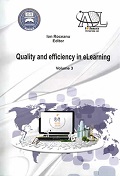THE EVALUATION OF THE SPORT TRAININGS EFFECT ON CHILDREN’S BALANCE USING AMTI NETFORCE CELL
THE EVALUATION OF THE SPORT TRAININGS EFFECT ON CHILDREN’S BALANCE USING AMTI NETFORCE CELL
Author(s): Iuliana Boroş-Balint, Ion Petre Barobos, Dumitru Rareş Ciocoi-Pop, Dan Mihai GherţoiuSubject(s): Education
Published by: Carol I National Defence University Publishing House
Keywords: technology; sport training; psycho motor development; balance
Summary/Abstract: Technology nowadays makes a huge impact on education in all its aspects. It can provide objective data in fields of study where subjectivity was a concern. In this respect we aim to demonstrate using technology that practicing sports on a daily basis have a positive influence on psycho motor development of children. Among the psychomotor components we choose to study balance. We used an Amti netforce cell to evaluate the balance of 1st grade pupils. This platform records the projection of the mass center of the tested subject on three axes. There are different stances used to evaluate balance. The experiment hypothesis is that the practice of sport like activities daily during the school week will improve the balance of children. In the experiment we consider two groups. A control group who performs physical activities normal for a 6 to 7 years old child and the experimental group who performs sport activities daily at least from Monday to Friday as a duty because they are enrolled in a sport program school. We need the control group in order to be able to identify the aging related psycho motor development. The duration of the experiment was one year. We evaluated both groups using Amti NetForce cell at the beginning and the end of this period. The collected data is statistically analyzed in order to see if there is a significant difference between the final and initial moment of the experiment and between the two groups. We expect to prove our experiment hypothesis so offering an objective proof of the positive influence of sports on the psycho motor development of children and implicitly of their education.
Journal: Conference proceedings of »eLearning and Software for Education« (eLSE)
- Issue Year: 9/2013
- Issue No: 03
- Page Range: 60-65
- Page Count: 6
- Language: English

